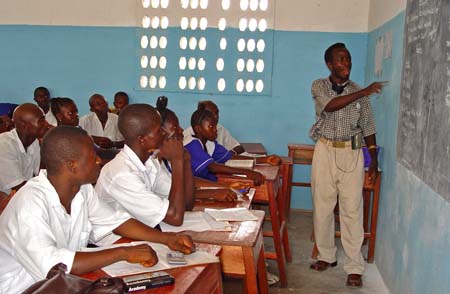Attention: We Want to Mentor Teachers
 While it is praise-worthy to provide young people with mentoring experiences, the quantity of young people in need is staggering. Bringing professional mentoring to teachers offers a way to impact hundreds of young people with each mentoring relationship. Practitioners of education innovations have repeatedly found that targeting teachers with innovations is a higher impact strategy than engaging with young learners directly.
When CODE first decided to explore ways of bringing mentoring opportunities to teachers, we started by exploring the availability and willingness of qualified mentors. We reached out to associations of Advanced Placement (AP) and International Baccalaureate (IB) teachers—especially those already experienced in educating in different countries and cultures. In short order we were able to drum up scores of volunteers willing to commit at least an academic year’s worth of digital mentoring.
While it is praise-worthy to provide young people with mentoring experiences, the quantity of young people in need is staggering. Bringing professional mentoring to teachers offers a way to impact hundreds of young people with each mentoring relationship. Practitioners of education innovations have repeatedly found that targeting teachers with innovations is a higher impact strategy than engaging with young learners directly.
When CODE first decided to explore ways of bringing mentoring opportunities to teachers, we started by exploring the availability and willingness of qualified mentors. We reached out to associations of Advanced Placement (AP) and International Baccalaureate (IB) teachers—especially those already experienced in educating in different countries and cultures. In short order we were able to drum up scores of volunteers willing to commit at least an academic year’s worth of digital mentoring.
The idea is to pair these experienced educators with younger and less experienced teachers (within their same fields) and then to structure an interchange between the senior and the junior teachers over an academic year with a focus on teaching methodologies more than content. Mentors would be trained to share their experience and resources relevant to teamwork, games, community engagement, immersive learning and activities designed to bolster critical thinking. Mentees (or protégées) could be in routine feedback with the pilot facilitator’s to help improve content and focus.
We spent a few months engaging with education sections at various large development organizations, receiving plenty of encouragement and interest; but little actionable commitment. To build a reasonably secure and open source environment to support these interactions would be a relatively easy process. With the mentors and the environment taken care, Mentor Teach requires a partner with field access to a body of educators (or to a teacher training college/facility) and the leverage necessary to extract meaningful commitment to a pilot project of this variety.
If anyone is interested in moving forward with a project of this variety, please let us know. We’re happy to share the documents that we’ve put together in explanation of this approach and we’re happy to support any team that is willing to put in the work to realize this vision.